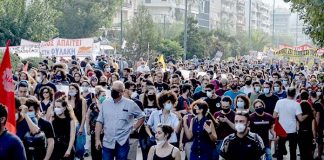Greece narrowly avoided default in May by scraping together the €750 million debt repayment due to the IMF. The European Union is tightening the screws, demanding the new radical left Syriza government capitulate to accept further austerity in exchange for another bailout.
Another large IMF repayment is due on June 5 and in July €3.5 billion more is due to the ECB. The Syriza government is starting to buckle under the pressure.
It has given the green light to a swathe of privatisations. The sell off of Piraeus, Greece’s biggest port, is now going ahead despite initial promises from Syriza to block it. The Piraeus privatisation is one of the demands the EU has raised as a precondition for releasing the next bailout.
This is clearly laying the groundwork for even more concessions to the creditors’ austerity agenda. Defense Minister Panos Kammenos told an economic conference in Athens that the railways could soon be privatised too. Finance Minister Varoufakis has also given the go ahead to sell off regional airports, despite this being another measure the party opposed in the past.
The government only managed to meet the last IMF repayment by raiding money from public bodies includes local governments, hospitals and universities, issuing a decree in April forcing them to deposit excess funds to the Greek central bank. Once these bodies run out of money they won’t be able to pay wages.
Although Syriza managed to scrape together public sector wages in April and May, they paid for this by raiding pension funds. Before its election Syriza opposed raiding public bodies to service debt repayments, but now it is implementing the very same policies.
The government also seized €300 million in EU subsidies meant to go to farmers. State daycare centres have had their budgets halved, which will mean sacking 10,000 workers and 40,000 fewer spots for children over the 2015-16 financial year.
Despite the anti-austerity rhetoric that pushed Syriza to power, their strategy so far has been to buy time from the EU and quietly continue the same cuts and privatisations that have impoverished working people in Greece for the past six years.
Negotiations
Greece has been locked in negotiations with its EU creditors for more than 100 days to try and reach another bailout deal of €7.2 billion, avoid defaulting on its debt repayments, and remain in the Eurozone.
An agreement was reached in February to extend the current €240 billion bailout for another four months. But the institutions are refusing to release any more money, saying the austerity measures Syriza has implemented so far aren’t enough.
Signalling an attempt to appease the tensions with the EU, Syriza leader Alex Tsipras reshuffled the negotiating team and removed Finance Minister Varoufakis. His abrasiveness and anti-austerity rhetoric had become a barrier to cuddling up to the EU.
Varoufakis was replaced by Euclid Taskalotos, a Tsipras ally well liked by the creditors who has been described a “classic Marxist” who has “learned to make compromises with capitalist reality”.
Syriza’s so called “red lines” that it claims it will not cross during the negotiations, no more cuts to pensions and wages, have already been tested, pushed and crossed. These concessions to job cuts, squeezing public money and privatizations are all signs the Tsipras is determined to find a way to meet the EU’s demands.
There is also talk of the government holding a referendum over any agreement Tsipras does make for the bailout. This would allow Syriza to maneuver around its election promises and paper over the backdowns.
Anti-austerity movements
But the people who voted for Syriza hoping for an end to the cuts and the lay-offs show no sign of giving in.
Workers at Hellenic Petroleum have seen the results of privatisation there, after an explosion on site injured six workers. In May the entire refinery struck. The Piraeus dock-workers staged a 24-strike against privatisation this month too. Nikos Georgiou, president of the dockers’ union at Piraeus port said, “We get huge solidarity from ordinary people. If a government that calls itself left continues neo-liberal policies then we will resist it.”
ERT, the state broadcaster that was run under worker’s control at the height of the anti-austerity campaign, still hasn’t reinstated everyone who was sacked. The government has agreed to reopen it but said workers would be reinstated gradually, in alphabetical order. But the union decided this wasn’t quick enough, and marched on the ERT offices to implement the decision immediately.
Hospital workers are holding a national strike demanding an end to understaffing as a result of austerity.
It is this kind of workers’ activity on a mass scale that force an end to the austerity Syriza is prosecuting and pose an alternative.





